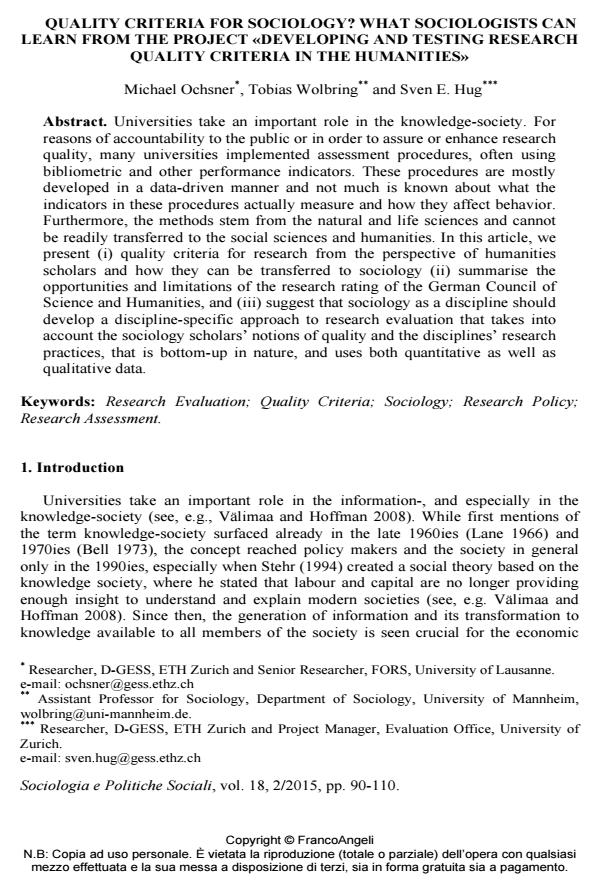Quality criteria for sociology? What sociologists can learn from the project «developing and testing research quality criteria in the humanities»
Titolo Rivista SOCIOLOGIA E POLITICHE SOCIALI
Autori/Curatori Michael Ochsner, Tobias Wolbring, Sven E. Hug
Anno di pubblicazione 2015 Fascicolo 2015/2
Lingua Inglese Numero pagine 21 P. 90-110 Dimensione file 126 KB
DOI 10.3280/SP2015-002005
Il DOI è il codice a barre della proprietà intellettuale: per saperne di più
clicca qui
Qui sotto puoi vedere in anteprima la prima pagina di questo articolo.
Se questo articolo ti interessa, lo puoi acquistare (e scaricare in formato pdf) seguendo le facili indicazioni per acquistare il download credit. Acquista Download Credits per scaricare questo Articolo in formato PDF

FrancoAngeli è membro della Publishers International Linking Association, Inc (PILA), associazione indipendente e non profit per facilitare (attraverso i servizi tecnologici implementati da CrossRef.org) l’accesso degli studiosi ai contenuti digitali nelle pubblicazioni professionali e scientifiche.
Universities take an important role in the knowledge-society. For reasons of accountability to the public or in order to assure or enhance research quality, many universities implemented assessment procedures, often using bibliometric and other performance indicators. These procedures are mostly developed in a data-driven manner and not much is known about what the indicators in these procedures actually measure and how they affect behavior. Furthermore, the methods stem from the natural and life sciences and cannot be readily transferred to the social sciences and humanities. In this article, we present (i) quality criteria for research from the perspective of humanities scholars and how they can be transferred to sociology (ii) summarise the opportunities and limitations of the research rating of the German Council of Science and Humanities, and (iii) suggest that sociology as a discipline should develop a discipline-specific approach to research evaluation that takes into account the sociology scholars’ notions of quality and the disciplines’ research practices, that is bottom-up in nature, and uses both quantitative as well as qualitative data.
Parole chiave:Research Evaluation; Quality Criteria; Sociology; Research Policy; Research Assessment
- The future of research assessment in the humanities: bottom-up assessment procedures Michael Ochsner, Sven Hug, Ioana Galleron, in Palgrave Communications 17020/2017
DOI: 10.1057/palcomms.2017.20
Michael Ochsner, Tobias Wolbring, Sven E. Hug, Quality criteria for sociology? What sociologists can learn from the project «developing and testing research quality criteria in the humanities» in "SOCIOLOGIA E POLITICHE SOCIALI" 2/2015, pp 90-110, DOI: 10.3280/SP2015-002005